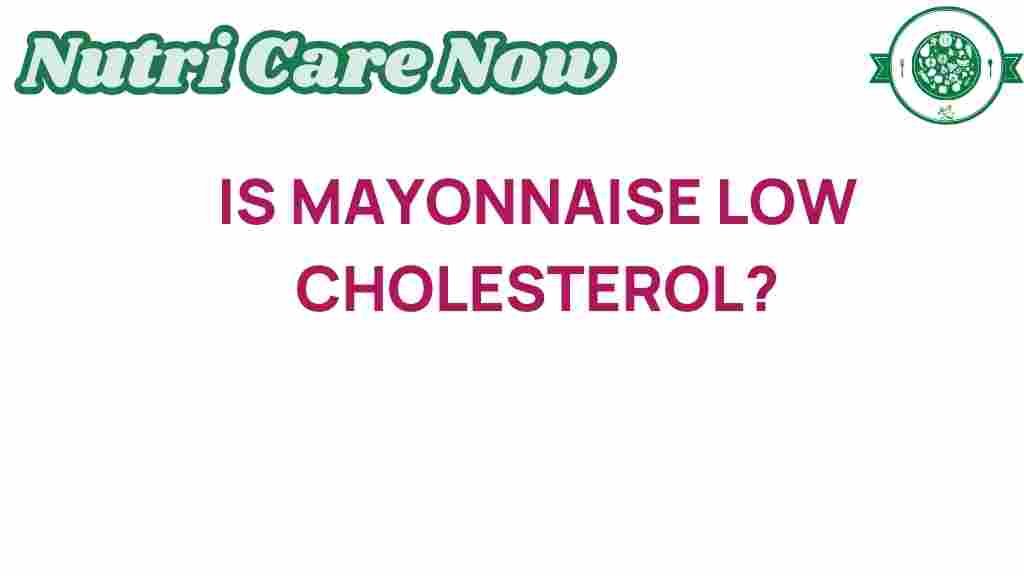Is Mayonnaise Low Cholesterol? Discover the Truth Behind This Condiment
Mayonnaise is a popular condiment, often found in sandwiches, salads, and dips. As health consciousness rises, many people are questioning the impact of various foods on their health, particularly concerning cholesterol levels and heart health. In this article, we will explore the relationship between mayonnaise and cholesterol, debunk common food myths, and analyze how mayonnaise fits into a balanced diet.
Understanding Cholesterol and Dietary Fats
Before diving into mayonnaise, it’s essential to understand what cholesterol is and how dietary fats affect our health. Cholesterol is a waxy substance found in every cell of the body and is needed to produce hormones, vitamin D, and substances that help digest foods. However, too much cholesterol in the blood can lead to heart disease.
There are two types of cholesterol:
- Low-Density Lipoprotein (LDL): Often referred to as “bad” cholesterol, high levels of LDL can lead to plaque buildup in arteries, increasing the risk of heart disease.
- High-Density Lipoprotein (HDL): Known as “good” cholesterol, HDL helps remove LDL cholesterol from the bloodstream.
Dietary fats play a significant role in cholesterol levels. There are three main types of fats:
- Saturated Fats: Found in animal products and some plant oils, these can raise levels of LDL cholesterol.
- Trans Fats: Often found in processed foods, these are particularly harmful and should be avoided.
- Unsaturated Fats: Found in olive oil, nuts, and avocados, these can help improve cholesterol levels when consumed in moderation.
The Nutritional Profile of Mayonnaise
Mayonnaise is primarily made from egg yolks, oil, and vinegar or lemon juice. Its nutritional profile varies depending on the type of oil used and any additional ingredients. Here’s a breakdown of the typical nutritional content of mayonnaise:
- Calories: One tablespoon of mayonnaise contains about 90 calories.
- Fats: Approximately 10 grams of fat, mostly from oil.
- Cholesterol: About 5 mg per tablespoon, depending on the recipe.
When considering mayonnaise’s impact on cholesterol, it’s important to look at these fat types. Most traditional mayonnaise is made with vegetable oils, which are primarily unsaturated fats. This can make mayonnaise a healthier option than other high-fat condiments, like butter or cream-based dressings.
Mayonnaise and Cholesterol: The Myths
Many food myths circulate about mayonnaise and its effects on health. Let’s explore some common misconceptions:
- Myth 1: Mayonnaise is high in cholesterol and should be avoided.
- Myth 2: All fats are bad for heart health.
- Myth 3: Low-fat diets are the best way to maintain healthy cholesterol levels.
In reality, mayonnaise contains a small amount of cholesterol, but when consumed in moderation as part of a balanced diet, it is unlikely to have a significant impact on your cholesterol levels. Additionally, not all fats are detrimental; unsaturated fats can be beneficial for heart health.
Incorporating Mayonnaise into a Healthy Diet
So, how can you enjoy mayonnaise while maintaining a heart-healthy diet? Here are some tips:
- Choose Quality Ingredients: Look for mayonnaise made with healthy oils (like olive oil) and free from artificial preservatives.
- Portion Control: Use mayonnaise in moderation. A little goes a long way in adding flavor to dishes.
- Explore Alternatives: Consider low-fat or lighter versions of mayonnaise if you’re concerned about calories and fats.
Mayonnaise Substitutes
If you’re looking to reduce your mayonnaise intake or switch things up, here are some alternatives:
- Greek Yogurt: A creamy, protein-rich substitute that can be used in salads and dips.
- Avocado: Offers healthy fats and a rich flavor, perfect for spreads and dressings.
- Mustard: A low-calorie condiment that adds tang without the fat.
Step-by-Step: Making Healthier Mayonnaise at Home
Making your mayonnaise can be a fun and healthier alternative to store-bought options. Here’s a simple recipe:
Ingredients:
- 1 large egg at room temperature
- 1 tablespoon Dijon mustard
- 1 tablespoon white wine vinegar or lemon juice
- 1 cup light olive oil or avocado oil
- Salt to taste
Instructions:
- In a tall container, combine the egg, mustard, and vinegar.
- Using an immersion blender, blend the mixture until smooth.
- Slowly drizzle in the oil while continuing to blend until the mayonnaise thickens.
- Season with salt to taste and store in the refrigerator for up to one week.
Troubleshooting Common Issues
If you run into problems while making mayonnaise, here are some helpful tips:
- Separation: If your mayonnaise separates, try to whisk in a little water or another egg yolk to re-emulsify.
- Too Thick: Thin it out with a little water or lemon juice until you reach your desired consistency.
- Too Sour: If it’s too tangy, add a bit of sugar or honey to balance the flavors.
Conclusion: The Truth About Mayonnaise and Cholesterol
In conclusion, mayonnaise is not inherently a high-cholesterol food. When made with healthy oils and consumed in moderation, it can be a part of a balanced diet that supports heart health. Understanding the role of dietary fats and cholesterol is crucial in dispelling food myths that may lead to unnecessary restrictions.
Mayonnaise offers versatility as a condiment and can enhance the flavor of many dishes. Remember, the key to a healthy diet is variety and moderation. So, feel free to enjoy your mayonnaise while being mindful of your overall dietary choices.
For more information on heart health and nutrition, check out this informative resource. And for a delicious homemade mayonnaise recipe, visit this link.
This article is in the category Health and created by NutriCareNow Team

1 thought on “Is Mayonnaise Low Cholesterol? Discover the Truth Behind This Condiment”